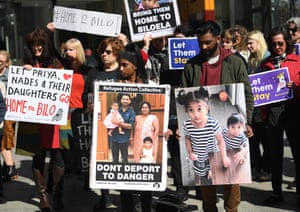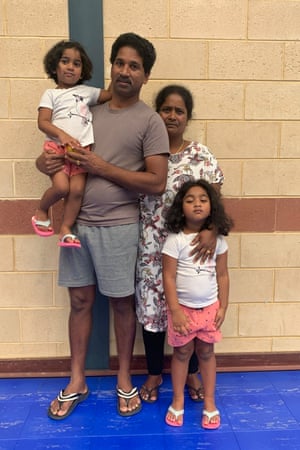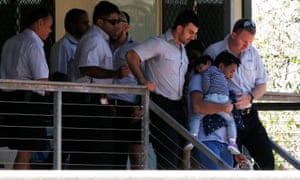Extract from The Guardian

Priya, Nades, Kopika and Tharunicaa’s movement is limited and everywhere they go they are escorted by security guards
by Josh Taylor
When five-year-old Kopika Murugappan goes to school, there is one thing that sets her apart from her fellow students.
“Recently she started telling us that her friends are asking why she is always accompanied by guards to school, when they are taken to school by their parents,” says her mother, Priya.
It has been more than 1,000 days since Priya, her husband, Nades, and their two children, Kopika and Tharunicaa, 3, were moved from the regional Queensland town of Biloela, and the family is preparing to spend their third Christmas in immigration detention, their second on Christmas Island.

They have been the only detainees for more than a year, other than those in a separate part of the centre who have had their visas revoked after being convicted of crimes in Australia.
The family can only leave their accomodation to take Kopika to school, or to go to the recreation centre, and those trips must be authorised by Australian Border Force at least two days in advance.
They cannot visit friends on Christmas Island, and everywhere they go they are escorted by security guards.
“When [Kopika] goes to school, she is very happy but when she comes home, she’s really unhappy,” Priya says.
“She wants to go shopping. She’s really unhappy being in this detention centre.”
Priya and Nades travelled to Australia seeking asylum by boat separately, and then married and settled in the regional Queensland town of Biloela, where their two daughters were born. After asylum claims for three out of the four family members were unsuccessful, they were taken into detention from Biloela in March 2018, and ended up on Christmas Island when a government attempt to deport them in August 2019 was halted by a last-minute injunction.
The family had been put on a flight from Melbourne when the injunction was ordered. After a short stop in Darwin they were moved to the detention centre on Christmas Island, which the federal government had reopened to house asylum seekers transferred from Nauru and Manus Island for medical treatment under the since repealed medevac legislation.
Speaking through an interpreter, Priya says every day on Christmas Island drags.
“We spend our day, either in the bedroom or the dining room. It’s really boring … For us, it’s very depressing and lonely,” she says. “There is no privacy, when me and my husband are trying to spend time together. We have no privacy.”
‘I can’t even see my father’
The family is kept in the Phosphate Hill Alternative Place of Detention, in a demountable consisting of a bedroom and living room. It has been used since 2001 as temporary accomodation for families.
Most of the day, Priya says, is spent looking after three-year-old Tharunicaa while Kopika is at school.
"When [Kopika] goes to school, she is very happy but when she comes home, she’s really unhappy"
There is limited internet access, and Priya says she has not been able to make video calls to her friends and family, including at times to her father, who is unwell.
“I’m really depressed that I can’t even see my father when he’s really unwell.”
The Department of Home Affairs told a Senate estimates committee in October last year that the family has food brought to them, which they can cook in a separate shared kitchen facility, and the centre also has a children’s play area.
A statement from the Department of Home Affairs said the family had access to health and welfare services and their detention placement was regularly reviewed.
“Australian Border Force (ABF) has deemed the current placement suitable for the family,” it said.
The department said Border Force regularly consulted the family about any concerns to accommodation arrangements to ensure suitability and make changes where warranted.
“No concerns have been raised by the family in relation to these arrangements,” it said.
As of October 2019, the department said it had spent $4.5m keeping
the family in detention, including $2.5m in detention costs, $1.1m in
travel and $300,000 in legal costs.
The Tamil family are removed from the Mercure Hotel in Darwin in August 2019. Photograph: Darrian Traynor/Getty Images
Since then there have been numerous further court appearances.
The department did not respond to multiple requests for updated costs.
The court case
The family remains in detention on Christmas Island awaiting the outcome of a complex federal court case over whether Tharunicaa was denied procedural fairness over her application for a visa.
The rest of the family have exhausted their appeals.
In April, Justice Mark Moshinsky ruled that Tharunicaa had been denied procedural fairness, but the federal government has since appealed.
Until the outcome of the appeal is determined the family will remain in detention indefinitely, barring ministerial intervention.
Priya says the support the family has received from the people of Biloela and across Australia helps sustain them.
“It is because of your support, we’re staying strong,” she says. “We want our supporters to ensure we return to Biloela safely. Over the last three years, you have been a great help. And I’m hopeful all your hard work means we will end up in Biloela.”
No comments:
Post a Comment